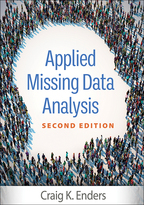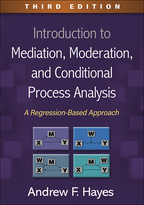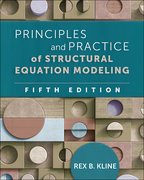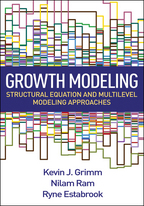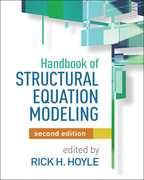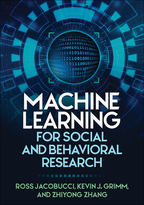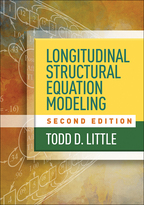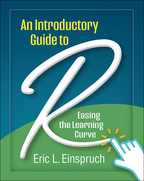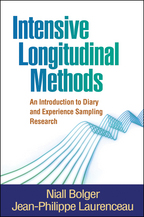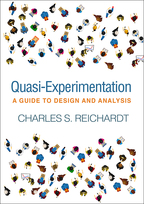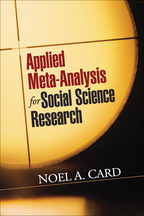Applied Missing Data Analysis
Second Edition
Craig K. Enders
Hardcovere-bookprint + e-book
Hardcover
orderAugust 31, 2022
ISBN 9781462549863
Price: $87.00 546 Pages
Size: 7" x 10"
Read the Series Editor's Note by Todd D. Little
“The book is well written….The author successfully achieved the goal of helping the reader to become familiar with basic concepts in missing data analysis procedures, and to feel comfortable using these procedures in a variety of practical and social science applications. It contains very useful examples and illustrations in the applied social sciences.”

—American Statistician (on the first edition)
“The second edition of Applied Missing Data Analysis is a bold, top-to-bottom revision that makes a phenomenal book even better. Enders offers a completely updated treatment, including such important topics as models with continuous and categorical variables, Bayesian missing data approaches, methods for missing not at random processes, and even a guide to how researchers should report their missing data analyses. Beyond the central focus on missing data, I can already hear myself saying, 'Go read Enders's book!' to students and colleagues with questions about how maximum likelihood estimation works, the logic of Markov Chain Monte Carlo methods, and so much more. This book is exemplary teaching that you can hold in your hands. I will recommend it with the greatest enthusiasm to students, faculty, and applied researchers alike for many years to come.”

—Gregory R. Hancock, PhD, Professor and Distinguished Scholar-Teacher, Department of Human Development and Quantitative Methodology, University of Maryland, College Park
“Approaches for dealing with missing data have progressed greatly in the statistical and methodological literatures, and the second edition of this exemplary book thoroughly presents and synthesizes these developments. The book makes sophisticated statistics amazingly accessible and offers a great deal to a wide audience, including statisticians, data analysts, substantive researchers, and quantitative students. I learn something new (or better understand something I thought I knew) every time I pick up this book! The presentation of how to report results from a missing data analysis, which gives explicit examples of such reporting for a wide variety of scenarios, is particularly useful. With an abundance of examples, figures, and illustrations to enhance the crystal-clear exposition, this is the 'go-to' book for dealing with missing data in statistical modeling.”

—Donald Hedeker, PhD, Department of Public Health Sciences, University of Chicago
“Thorough, cutting-edge, and far and away the clearest text available on missing data analysis. Written by a world-renowned expert who is a gifted instructor, this book is accessible enough for applied researchers with introductory statistics and regression knowledge, is an outstanding text for a missing data course, or can be used to fill gaps in methodologists’ understanding of the notoriously opaque missing data literature. For researchers who learned 'modern' missing data-handling methods years ago—much has changed. For instance, the second edition will bring you up to speed on how to accommodate missingness in conjunction with non-normal and discrete outcomes, nonlinear and interactive relationships, and multilevel structures; choose among non-model-based versus model-based multiple imputation methods; and conceptualize and implement sensitivity analyses to assess the impact of alternative missing data assumptions. Reading this book feels like being guided by the author through a comprehensive one-on-one workshop. A gift to the field!”

—Sonya K. Sterba, PhD, Professor of Psychology and Director, Quantitative Methods Program, Vanderbilt University
“Simply stated, this is the best textbook available on missing data analysis. The book provides comprehensive coverage, is highly accessible, and is written by one of the experts in the field. The concepts involved in missing data analysis are complex, and it is obvious that Enders takes the 'teaching mission' seriously. The writing is clear, the figures and tables are very helpful in promoting understanding, and the simulations developed for the text are helpful in conveying the strengths and weaknesses of various missing data treatments. The excellent companion website provides important, updated resources for teaching and learning. The software scripts available on the website are very useful for researchers wishing to apply the missing data methods to real data.”

—Keenan A. Pituch, PhD, Edson College of Nursing and Health Innovation, Arizona State University
—American Statistician (on the first edition)
“The second edition of Applied Missing Data Analysis is a bold, top-to-bottom revision that makes a phenomenal book even better. Enders offers a completely updated treatment, including such important topics as models with continuous and categorical variables, Bayesian missing data approaches, methods for missing not at random processes, and even a guide to how researchers should report their missing data analyses. Beyond the central focus on missing data, I can already hear myself saying, 'Go read Enders's book!' to students and colleagues with questions about how maximum likelihood estimation works, the logic of Markov Chain Monte Carlo methods, and so much more. This book is exemplary teaching that you can hold in your hands. I will recommend it with the greatest enthusiasm to students, faculty, and applied researchers alike for many years to come.”
—Gregory R. Hancock, PhD, Professor and Distinguished Scholar-Teacher, Department of Human Development and Quantitative Methodology, University of Maryland, College Park
“Approaches for dealing with missing data have progressed greatly in the statistical and methodological literatures, and the second edition of this exemplary book thoroughly presents and synthesizes these developments. The book makes sophisticated statistics amazingly accessible and offers a great deal to a wide audience, including statisticians, data analysts, substantive researchers, and quantitative students. I learn something new (or better understand something I thought I knew) every time I pick up this book! The presentation of how to report results from a missing data analysis, which gives explicit examples of such reporting for a wide variety of scenarios, is particularly useful. With an abundance of examples, figures, and illustrations to enhance the crystal-clear exposition, this is the 'go-to' book for dealing with missing data in statistical modeling.”
—Donald Hedeker, PhD, Department of Public Health Sciences, University of Chicago
“Thorough, cutting-edge, and far and away the clearest text available on missing data analysis. Written by a world-renowned expert who is a gifted instructor, this book is accessible enough for applied researchers with introductory statistics and regression knowledge, is an outstanding text for a missing data course, or can be used to fill gaps in methodologists’ understanding of the notoriously opaque missing data literature. For researchers who learned 'modern' missing data-handling methods years ago—much has changed. For instance, the second edition will bring you up to speed on how to accommodate missingness in conjunction with non-normal and discrete outcomes, nonlinear and interactive relationships, and multilevel structures; choose among non-model-based versus model-based multiple imputation methods; and conceptualize and implement sensitivity analyses to assess the impact of alternative missing data assumptions. Reading this book feels like being guided by the author through a comprehensive one-on-one workshop. A gift to the field!”
—Sonya K. Sterba, PhD, Professor of Psychology and Director, Quantitative Methods Program, Vanderbilt University
“Simply stated, this is the best textbook available on missing data analysis. The book provides comprehensive coverage, is highly accessible, and is written by one of the experts in the field. The concepts involved in missing data analysis are complex, and it is obvious that Enders takes the 'teaching mission' seriously. The writing is clear, the figures and tables are very helpful in promoting understanding, and the simulations developed for the text are helpful in conveying the strengths and weaknesses of various missing data treatments. The excellent companion website provides important, updated resources for teaching and learning. The software scripts available on the website are very useful for researchers wishing to apply the missing data methods to real data.”
—Keenan A. Pituch, PhD, Edson College of Nursing and Health Innovation, Arizona State University

